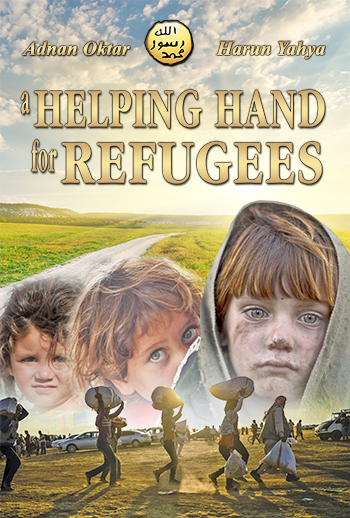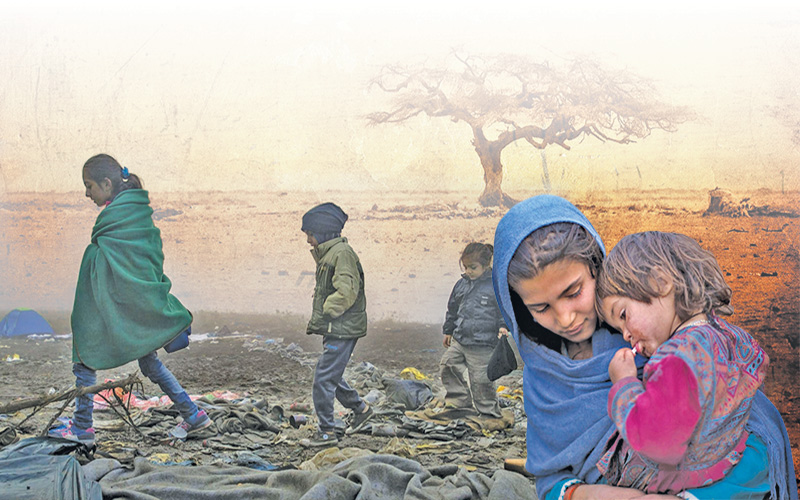Bigotry: The Dark Danger
A Helping Hand for Refugees

DOWNLOAD THE BOOK
CHAPTERS OF THE BOOK
- Introduction
- Supporting refugees is the behavior that will be most pleasing to God
- Adnan Oktar's remarks concerning refugees on A9 TV
- Events in Myanmar are crime against humanity
- A cry for help to the U.N. from Rohingya of Myanmar
- What if you were living in a refugee camp?
- The crime against humanity in Yarmouk must be ended as a matter of urgency!
- Behind the persecution in Myanmar
- How does it feel to be a Rohingya?
- One of the dozens of problems facing Yemen is immigration
- Refugees: Stopping the Madness
- The safety of our Syrian refugee brothers is entrusted to the hospitable Turkish people
- Buffer Zone: A Safe Haven for the Syrians
- A secure zone must be established at once on the Turkish-Syrian border
- The conundrum of Libya's refugees and migrants
- Drowning migrants is a blot on humanity
- Are the boat people a burden for Thailand?
- Deafening silence over Rohingya issue
- What can European countries do against the tide of Migration?
- The Rohingya Muslims are being exiled in their own lands
- Syrian refugees in the 4th year of the crisis
- Syria: The downward spiral of desolation
- Illegal immigrants: Only a statistic in Europe
- Syria’s human tragedy
- Yarmouk cries for help
- The world refugee problem can be solved with love
- Adnan Oktar's Remarks Concerning Refugees on A9 TV
- Europe must step up for humanity
- Nobody to wipe Rohingyas’ tears
- Asylum seekers: A problem of humanity or security?
- It is no economic loss to help Syrian refugees
- A heart for helping refugees
- When conscience fails, children suffer
- Events of global shame
- Will Europe pass the refugee test?
- Condemning refugees to death
- The European refugee crisis: Only if there were some empathy
- The priority in Libya must be to establish love and affection between the blocs: Consensus will then come naturally
- Refugees with no great expectation
- Walls cannot be a solution to security issues
- Refugees not a threat, but an important asset for Europe
- What will election victory bring to the people of Rohingya?
- Humans have rights on paper, but apparently not in real life
- EU, Turkey find silver lining
- Refugees are the victims of the Paris attacks, not its perpetrators
- Being leaderless is the reason behind the oppression Muslims suffer
- The EU is in danger of taking Turkey for granted
- Conclusion
< <
6 / total: 48
What if you were living in a refugee camp?Kuwait Times - 3 February 2014
Have you ever thought of taking to the streets on a cold winter day with no possessions, money, food or even an ID card? Can you imagine having your children with you and having nothing to protect them or keep them warm with? Six million Syrians had never thought of that either, but today they have all had to abandon their homes. For these people who have become refugees, the real problem starts now; dispersed families and poor and unhealthy living conditions, thousands losing their lives on the roads. Syria was one of the countries with the most refugee camps even before the civil war. Some of those in the very worst conditions in Syria, which hosts two million refugees in camps, are the Palestinians living there as refugees. The population of the Yarmouk refugee camp, initially set up for Palestinians fleeing Israel – Gaza war in 1957, reached 600,000 with increasing waves of migration. Although some people have left the camp as the civil war went on, it still has a large refugee population. Life in the camp - which regime forces targeted then placed under an embargo, refusing to allow food and medicines in - is becoming harder by the day. So much so that when people were forced for want of food to try and live on tree leaves last year, Syrian religious scholars issued a fatwa saying that "dog and cat meat can be eaten." That is by itself sufficient to show the conditions the people there are struggling. The refugees in the Yarmouk camp need urgent humanitarian assistance. This is of course only one of the most urgent situations but the word "refugee" now represents the same difficulty for almost everyone. There is no improvement in the lives of all refugees, particularly in the Middle East, not just those forced to depart from Syria. Increasing numbers of people are being forced to abandon the places they live in every year. Some of these migrate within the country concerned, while the rest move to either neighboring or more distant lands. Afghan refugees, 95% of whom have sought refuge in neighboring countries such as Pakistan and Iran, represent the largest part of the world's refugees; one in every four refugees in the world is an Afghan. Afghanistan is followed by Somalia and Iraq. There are 450,000 UN-registered refugees in Lebanon. These refugees, living in 12 settlements under very harsh circumstances, are trying to survive in poverty. Their fundamental rights are denied them and they lack even symbolic political rights. In other words, these people are still living as refugees with no citizenship rights after 66 years. New generations are being born and growing up in refugee camps. So how can this problem of refugees be solved? The first requirement for people forced to migrate because of troubles at home is the right to enter countries where they can be safe and can move around freely. In this way, they will not be forced to wait at border crossings after long journeys, and at least the first step in the journey will be made easier. There is an urgent need for a union of Muslim states, resembling the European Union, to be set up to resolve this problem and the growing refugee question in the Middle East. In this way, citizens of countries that enjoy free rights of movement into one another, like the EU, will have a way out when troubles arise and will be able to find a humanitarian corridor. Rights such as dual nationality and the right to work without visas will put an end to conditions that restrict refugees and prevent them from living under humane conditions and provide a solution that all people of good conscience can be comfortable with. Even when we look at the implementation of a more humane phase by improving the lives of refugees, we still see the need for the Middle East to have its own union. In order for there to be a rapid solution to this emergency situation without lengthy political and bureaucratic procedures, everyone who espouses freedom and equality should call for such a union. This article was published in Kuwait Times: http://news.kuwaittimes.net/living-refugee-camp/ Link of Article in English: Link of Article in Turkish:
|
6 / total 48
You can read Harun Yahya's book A Helping Hand for Refugees online, share it on social networks such as Facebook and Twitter, download it to your computer, use it in your homework and theses, and publish, copy or reproduce it on your own web sites or blogs without paying any copyright fee, so long as you acknowledge this site as the reference.

